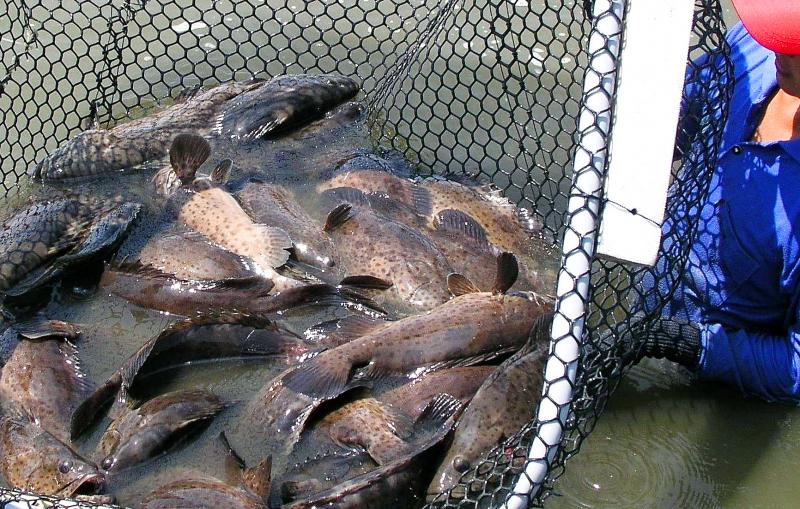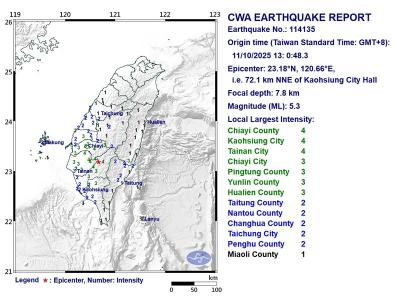Two fish farms in Pingtung County are being examined after Chinese authorities announced that they had found residue of illegal veterinary drugs in imported Taiwanese live groupers, Council of Agriculture (COA) officials said on Thursday.
The Chinese General Administration of Customs on Thursday last week issued a notice saying that it had found malachite green and crystal violet, which are banned for use in aquaculture in China, in live groupers imported from two fish farms owned by Wang Chih-yi (王志義) and Tai Chao-chung (戴兆鐘).
Chinese authorities said that they had suspended imports of fish from the two farms until further notice and would step up inspections of fish from other Taiwanese operations.

Photo: Lee Li-fa, Taipei Times
The suspension was confirmed by COA Deputy Minister Huang Chin-cheng (黃金城), who added that the council had temporarily suspended permits allowing the two farms to export live groupers to China as Taiwanese authorities look into the matter.
The Mainland Affairs Council said that Chinese customs notified Taiwanese animal quarantine authorities of the issue on Monday last week and asked that exports from the two farms to China be stopped while an investigation is conducted.
Exports of live groupers to China from other Taiwanese operations remain normal, Huang said.
Before the COVID-19 pandemic, Taiwan exported approximately 12,000 tonnes of live groupers to China annually, Fisheries Agency data showed.
However, due to logistics disruptions amid the pandemic, only 6,021 tonnes were exported to China in the first 11 months of last year, the data showed.
Following the notice from Chinese customs, Pingtung County Government officials on Thursday took samples from the two farms, Bureau of Animal and Plant Health Inspection and Quarantine Deputy Director-General Hsu Jung-ping (徐榮彬) said.
The bureau would consider further action after test results come back, Hsu said.
Malachite green is a synthetic dye that was once widely used in aquaculture as an antifungal agent, Hsu said.
It was banned in Taiwan after studies indicated that it might be carcinogenic.
Taiwan does not regulate the use of crystal violet because it is not commonly used in the industry, he said.
The Fisheries Agency inspects fish products before they are loaded on ships to be exported, said Lin Kuo-ping (林國平), the agency’s deputy director-general.
There are six licensed vessels that carry live fish to China, Lin said.
Wang said that he did not know how his fish could have been contaminated, as he had samples tested before sending a shipment to China in early November.
Wang, whose family has worked in the industry for more than six decades, said that he hopes a third-party inspector re-examines the fish.
Tai said he was told that a shipment of fish belonging to him was stopped at the Chinese border in October, but he had not shipped any groupers at that time.
Tai said he suspected someone might have exported the fish using his name, adding that he had reported the matter to the local authorities.
He said that he does not rule out the possibility of legal action.

The Central Weather Administration (CWA) today issued a sea warning for Typhoon Fung-wong effective from 5:30pm, while local governments canceled school and work for tomorrow. A land warning is expected to be issued tomorrow morning before it is expected to make landfall on Wednesday, the agency said. Taoyuan, and well as Yilan, Hualien and Penghu counties canceled work and school for tomorrow, as well as mountainous district of Taipei and New Taipei City. For updated information on closures, please visit the Directorate-General of Personnel Administration Web site. As of 5pm today, Fung-wong was about 490km south-southwest of Oluanpi (鵝鑾鼻), Taiwan's southernmost point.

Almost a quarter of volunteer soldiers who signed up from 2021 to last year have sought early discharge, the Legislative Yuan’s Budget Center said in a report. The report said that 12,884 of 52,674 people who volunteered in the period had sought an early exit from the military, returning NT$895.96 million (US$28.86 million) to the government. In 2021, there was a 105.34 percent rise in the volunteer recruitment rate, but the number has steadily declined since then, missing recruitment targets, the Chinese-language United Daily News said, citing the report. In 2021, only 521 volunteers dropped out of the military, the report said, citing

A magnitude 5.3 earthquake struck Kaohsiung at 1pm today, the Central Weather Administration said. The epicenter was in Jiasian District (甲仙), 72.1km north-northeast of Kaohsiung City Hall, at a depth of 7.8km, agency data showed. There were no immediate reports of damage. The earthquake's intensity, which gauges the actual effects of a temblor, was highest in Kaohsiung and Tainan, where it measured a 4 on Taiwan's seven-tier intensity scale. It also measured a 3 in parts of Chiayi City, as well as Pingtung, Yunlin and Hualien counties, data showed.

Nearly 5 million people have signed up to receive the government’s NT$10,000 (US$322) universal cash handout since registration opened on Wednesday last week, with deposits expected to begin tomorrow, the Ministry of Finance said yesterday. After a staggered sign-up last week — based on the final digit of the applicant’s national ID or Alien Resident Certificate number — online registration is open to all eligible Taiwanese nationals, foreign permanent residents and spouses of Taiwanese nationals. Banks are expected to start issuing deposits from 6pm today, the ministry said. Those who completed registration by yesterday are expected to receive their NT$10,000 tomorrow, National Treasury